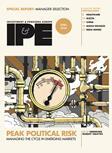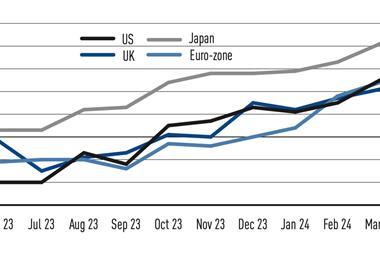Anne Maher discusses the Pensions Board report
Instead of the predicaments facing most European countries on the pensions front, Ireland has a window of opportunity, which Anne Maher, head of the Irish Pensions Board, is determined the country should grasp. The 143 recommendations in the board's recent report 'Securing retirement income' in-cludes that of having a pensions crock of gold ready for when the demographics turn sour.
Our demographics are more favourable than anyone else's in Europe as we have five economically active for every one retired. This will improve for the next 10 years, when it will rapidly deteriorate and by the middle of next century we will be down to less than two active for every one person retired. We know our costs will escalate. But there was no immediate sustainability problem with the public pension system." At the moment, the Irish economy is doing well, which gives a rare chance to plan ahead. As she says: "We would be silly not to."
But all is not well on the Irish pensions front as to the adequacy levels and coverage levels, which is why the national pensions policy initiative was launched. The initiative stimulated a big national debate about pensions issues with a very good response from the public and the pensions professionals by the mid-1997 cut-off date.
Following a national pensions conference and the feedback from this and a number of reports and surveys commissioned, the board felt "it had enough material gathered to formulate recommendations". The15-member board comprises the 'social partners', as well as ministries and pensions, insurance and industry representatives.
The report recommended a figure of Ir£100 ($140) per week as the basic state pension, which was at the level which would give the lowest paid 30% of the workforce in the private sector a pension equal to 50% of the average industrial wage. This figure could be used as reference in the future.
On costs grounds, this pension could be delivered more efficiently through the first rather than second pillar system, where the charge levels would hit too heavily on these smaller pensions, she points out.
"The mandatory or voluntary de-bate for second level pensions was a crucial issue," says Maher. There were several reasons why the re-port favours the voluntary ap-proach. "People who brought in mandatory systems found they have side effects that they never anticipated, in that the pensions contribution appears to become a payroll tax." Particularly telling was the Australian experience where employers went for the basic minimum, thus reducing the adequacy level.
"We have a good second pillar system, so the aim of any reforms should be to build on the good you have."
But the report did go for requiring employers to provide access to pensions for employees, though they need not contribute. "But the possibility of mandatory contributions for employers or employees is in reserve for future consideration." If the targets set in the report of 75% coverage after five years are not reached, "then the mandatory ap-proach could be a serious option," she adds.
Another drive to simplify the second pillar vehicles is the proposal for the Personal Savings Retirement Account, that could be a personal pension, an additional voluntary contribution product, a buy-out bond and individual pensions contract. "We are hoping the system will breakdown in future so that your are either in a trust scheme or a PSRA, and that the various existing products are swept up into PSRAs."
The idea of creating a fund that could reach Ir£30bn by 2031, was based on the simple proposition that problems are known to lie ahead, so why not be prudent and put money aside, says Maher.
"If we put money aside and invest it well, we will have the money to deal with increased demographic pressures." The board wants the fund to be independently run and to get the best returns with professional investment managers and to see the funds were untouched for other purposes.
Though the fund is mooted on the basis that it runs out in 2046, Maher reckons it should be kept under constant review and could be adjusted upwards and prolonged as re-quired. She points to the fact that the government has already set up a working party to examine this idea.
But Maher is cautious as to the relevance of the Irish approach elsewhere: "Ireland's position is untypical, not only are the demographics favourable, but we have a lower level of social welfare and a well developed funded occupational pensions. It may be fine for us, but not suit anyone else!"
But whatever the outcome from the board's report, she thinks one of the most vital tasks will be an educational one. "One of the main reasons why people do not have private pensions in Ireland is that they did not know they needed them." Fennell Betson"












No comments yet